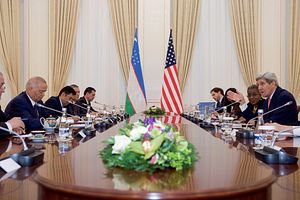Weekend reads:
Kazakhstan’s Developmental State of Mind: The theory of a developmental state — in which the messiness of political competition is put aside in favor of state-managed economic development — is attractive to Central Asia’s autocrats but only Kazakhstan has seemed to make a measure of success using the model first attributed to states in East Asia, such as Singapore. In a paper published in the Georgetown Journal of Asian Affairs, Sean Roberts writes, “If these indicators [meaning Kazakhstan’s economic and institutional growth] suggest that Kazakhstan presents an excellent example of how an authoritarian ‘developmental state’ model can spur development in the post-Soviet context, they suggest little about the sustainability of this development.” Herein lies the question regional watchers all have: what happens when President Nursultan Nazarbayev dies? Roberts explores further why this is an open question despite constitutional procedures. In short, “given the precedent set by Nazarbayev in the political manipulation of the constitution and state legislation, there is little reason to believe that others would follow these prescribed ‘rules of the game’ once Nazarbayev leaves the scene.”
Other good Kazakhstan reads: Make sure to first experience the sad, but useful, Oibai.kz (ойбай means “oh my” in Kazakh, as in “oh my god!”). The website just lists the current tenge exchange rates (dollars, euros, and rubles) as well as the oil price against a backdrop of grey government buildings and morose piano music. Then read the Reuters piece that explains why Kazakhs have few ways to speak out about their country’s economic plight. To further put some context to how Kazakhs are feeling and reacting to the tenge tumble, read Joanna Lillis reporting on the small protests that have been staged by people holding dollar mortgages.
What Should U.S. Policy in Central Asia Be? Nate Schenkkan, the project director for Freedom House’s Nations in Transit wrote a response to last week’s Carnegie report on U.S. Central Asia policy that draws out many of the criticisms regional watchers had with the report. The Carnegie report, written by Eugene Rumer, Richard Sokolsky, and Paul Stronski, attempts iterate what U.S. regional policy should be. The trouble, however, is much of the report resembles what is already in place (also check out Navbahor Imarova’s interview with Stronski for VOA — I’m not sold on his argument that the report presents anything new and different but it’s worth hearing nonetheless). Schenkkan focuses on the report’s recommendation that the U.S. not condition security cooperation on human rights performance. He points out that the United States routinely circumvents the very mechanisms already in place which set human rights conditions on cooperation. “Now is not the time for the United States to double down on a dangerously shortsighted understanding of security,” Schenkkan writes.

































